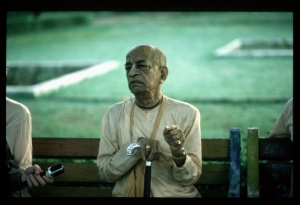SC 5 The Visnudutas To the Rescue

A.C. Bhaktivedanta Swami Prabhupada
Śukadeva Gosvāmī continued: My dear king, the order-carriers of Viṣṇu, the Viṣṇudūtas, immediately arrived when they heard the holy name of their master from the mouth of the dying Ajāmila, who had certainly chanted without offense because he had chanted in complete anxiety. The order-carriers of Yamarāja were snatching the soul from the core of Ajāmila's heart, but with resounding voices the Viṣṇudūtas forbade them to do so. (Śrīmad-Bhāgavatam 6.1.30-31)
The Messengers Dispatched by the Lord
The Yamadūtas, who are the assistants of Yamarāja, the superintendent of death, had come to drag Ajāmila away. Ajāmila appealed to his youngest son, Nārāyaṇa: "Nārāyaṇa, please come here! I'm dying!" Kṛṣṇa is so kind that as soon as He heard Ajāmila chant "Nārāyaṇa!" at the time of his death, He immediately dispatched His assistants, the Viṣṇudūtas, to give Ajāmila shelter.
Śrīla Viśvanātha Cakravartī Ṭhākura remarks that the Viṣṇudūtas came because they heard Ajāmila chant the holy name of their master, Nārāyaṇa, without considering why he was chanting. While chanting the name of Nārāyaṇa, Ajāmila was actually thinking of his son, but simply because they heard Ajāmila chant the Lord's name, the Viṣṇudūtas immediately came for Ajāmila's protection. Chanting of the Lord's holy name is actually meant for His glorification. Ajāmila, however, did not glorify the Lord: he simply chanted the holy name of Nārāyaṇa because of his excessive attachment to his son. Nevertheless, because of his past good fortune in having rendered devotional service to Nārāyaṇa in his youth, he apparently chanted the holy name in full devotional service and without offense. Thus that chanting was sufficient to cleanse him of all sinful reactions and assure him the protection of the Viṣṇudūtas.
The name Nārāyaṇa has the full potency of the Supreme Personality of Godhead - Nārāyaṇa, or Kṛṣṇa. That is the secret of nāma-saṅkīrtana, chanting the names of God. By chanting the holy name of Kṛṣṇa, we make immediate contact with Kṛṣṇa Himself. The reason for this is that the Lord's name is not material: it is spiritual and absolute. Thus there is no difference between Kṛṣṇa and His name.
Snatching the Soul
When the Viṣṇudūtas arrived, they spoke to the Yamadūtas with extreme gravity: "What are you doing? Stop! You cannot take this man to Yamarāja!"
A Vaiṣṇava, one who has surrendered to the lotus feet of Lord Viṣṇu, is always protected by Lord Viṣṇu's order-carriers. Because Ajāmila had chanted the holy name of Nārāyaṇa, the Viṣṇudūtas not only immediately arrived on the spot but also at once ordered the Yamadūtas not to touch him. By speaking with resounding voices, the Viṣṇudūtas threatened to punish the Yamadūtas if they continued trying to snatch Ajāmila's soul from his heart. The order-carriers of Yamarāja have jurisdiction over all sinful living entities, but the messengers of Lord Viṣṇu are capable of punishing anyone, including Yamarāja, if he wrongs a Vaiṣṇava.
Modern scientists do not know where to find the soul within the body with their material instruments, but here the Śrīmad-Bhāgavatam clearly explains that the soul is within the core of the heart (hṛdaya); it is from the heart that the Yamadūtas were trying to extract the soul of Ajāmila. The heart is part of the mechanical arrangement of the body. As the Lord says in the Bhagavad-gītā (18.61):
- īśvaraḥ sarva-bhūtānāṁ
- hṛd-deśe 'rjuna tiṣṭhati
- bhrāmayan sarva-bhūtāni
- yantrārūḍhāni māyayā
"The Supreme Lord is situated in everyone's heart, O Arjuna, and is directing the wanderings of all living entities, who are seated as on a machine made of the material energy." Yantra means "machine," such as an automobile. The driver of the machine of the body is the individual soul, who is also its director or proprietor, but the supreme director and proprietor is the Personality of Godhead in His form as the Supersoul.
One's body is created through the agency of māyā according to one's activities in one's past life; and according to one's activities in this life, māyā creates another body for the next life. At the appropriate time, one's next body is immediately chosen, and both the individual soul and the Supersoul transfer to that particular bodily machine. This is the process of transmigration of the soul.
During transmigration from one body to the next, the sinful soul is taken away by the order-carriers of Yamarāja and put into a particular type of hellish life in order to become accustomed to the condition in which he will live in his next body.